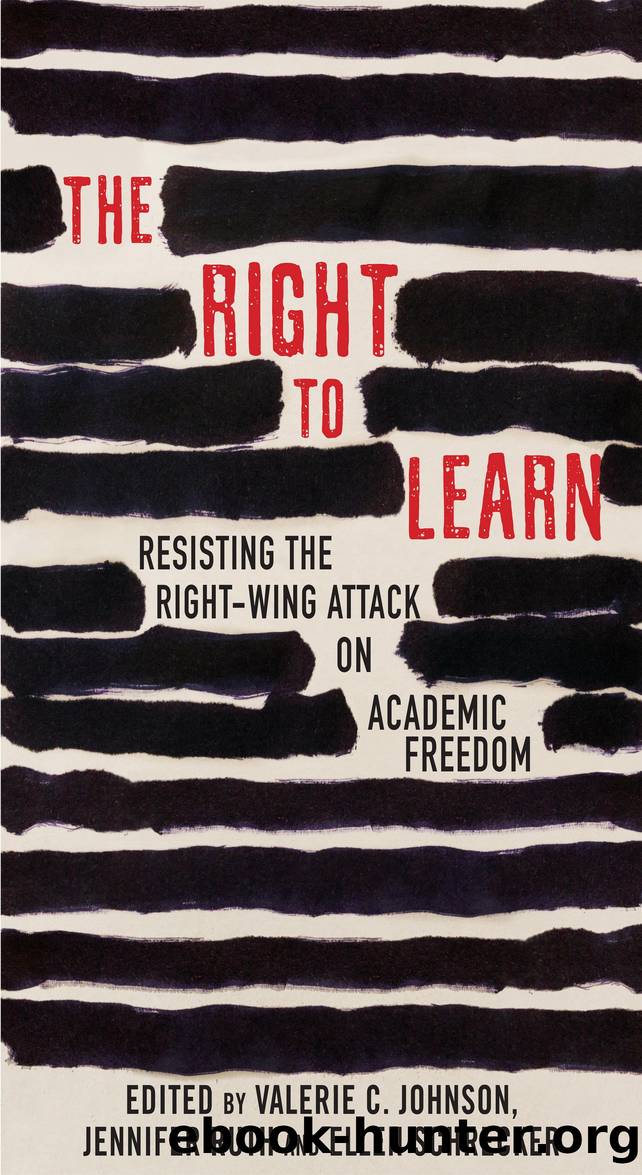The Right to Learn by Jennifer Ruth

Author:Jennifer Ruth [Ruth, Jennifer]
Language: eng
Format: epub
Publisher: Beacon Press
Published: 2024-09-15T00:00:00+00:00
Looking at our prose in retrospect, I can see that we were in that rhetorical bind that fastens around all those who try to satirize something that is fast becoming reality. The Marjorie Taylor Greene line has the rhythm of a joke and yet that is precisely what we were and are facing: partisan right-wing politicians claiming the authority to decide what curriculum is acceptable in the nationâs public institutions.
THE CAMPAIGN CONCLUDES
âShowing an unprecedented solidarity,â Schrecker reported in The Nation in March 2022, âthe academic community is mobilizing to confront what its members rightly perceive as an existential assault on their professional work and values.â14 In April, I reported on the Academe Blog that âthe resolution campaign has decisively turned a corner: faculty senates and AAUP chapters across the countryâin red states as well as in blueâhave passed resolutions to defend academic freedom to teach race and gender justice and critical race theory.â15 There was no point, many in red states seemed to feel, in waiting to see what happened with the bills. They were not going to go away on their own; they were too useful as political weapons for Republican politicians seeking election or reelection. The question of poking the bear had thus become irrelevant, and the senates at the universities of Georgia, Tennessee, and Mississippi all passed resolutions.
The campaign had proved more successful than weâd anticipated. I had initially commented that Iâd be happy with twenty-five institutions passing a resolution. By the end of the 2021â22 school year, at least sixty institutions had passed one.16 Individual AAUP chapters on campuses had too when their senates did not and, in some cases, in addition to their senates.
We pushed and prodded in the ways discussed above, but of course, where the campaign succeeded was entirely due to the sustained efforts of the faculty members on the campuses. Despite doubts and fears of retribution, these senators did the work of shepherding resolutions through numerous committee meetingsârevising and refining the textâall the way to senate floors.
The success of the documents as collective statements over the long term has yet to be known. They are largely untested in the sense that, to our knowledge, faculty have yet to invoke them in a court case or in the context of crises. All of these individual and collective efforts notwithstanding, the senate resolutions are only a beginning to the kind of collective faculty action demanded of this political moment, as a few of the senators whom Sarah Sklaw interviewed for the next chapter point out. The end of the right-wing campaign itself is not yet in sight. The resolutions model one effective step forward and show that in the midst of a country sliding toward authoritarianism, faculty canâand willâmobilize to defend the academic freedom that provides one crucial pillar of our endangered democracy.
Download
This site does not store any files on its server. We only index and link to content provided by other sites. Please contact the content providers to delete copyright contents if any and email us, we'll remove relevant links or contents immediately.
The Secret History by Donna Tartt(19088)
The Social Justice Warrior Handbook by Lisa De Pasquale(12190)
Thirteen Reasons Why by Jay Asher(8910)
This Is How You Lose Her by Junot Diaz(6887)
Weapons of Math Destruction by Cathy O'Neil(6280)
Zero to One by Peter Thiel(5802)
Beartown by Fredrik Backman(5754)
The Myth of the Strong Leader by Archie Brown(5507)
The Fire Next Time by James Baldwin(5446)
How Democracies Die by Steven Levitsky & Daniel Ziblatt(5219)
Promise Me, Dad by Joe Biden(5153)
Stone's Rules by Roger Stone(5088)
A Higher Loyalty: Truth, Lies, and Leadership by James Comey(4964)
100 Deadly Skills by Clint Emerson(4925)
Rise and Kill First by Ronen Bergman(4789)
Secrecy World by Jake Bernstein(4753)
The David Icke Guide to the Global Conspiracy (and how to end it) by David Icke(4720)
The Farm by Tom Rob Smith(4512)
The Doomsday Machine by Daniel Ellsberg(4490)
